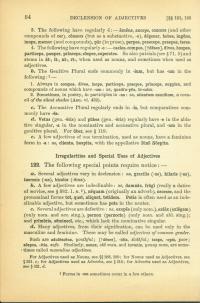122. The following special points require notice.
a. Several adjectives vary in declension.
gracilis (-us)
hilaris (-us)
inermis (-us)
bicolor (-ōrus)
b. A few adjectives are indeclinable.
damnās
frūgī (Dative of Service, see § 382.1, Note 2)
nēquam (originally an adverb)
necesse
tot, quot, aliquot, totidem (pronominal forms)
Potis is often used as an indeclinable adjective, but sometimes has pote in the neuter.
c. Several adjectives are defective.
exspēs [only nominative]
exlēx (exlēgem) [only nominative and accusative singular]
pernox (pernocte) [only nominative and ablative singular]
prīmōris, sēminecī, etc., [lack the nominative singular]
d. Many adjectives, from their signification, can be used only in the masculine and feminine. These may be called adjectives of common gender.
adulēscēns youthful
[† dēses], -idis slothful
inops, -opis poor
sōspe, -itis safe
Similarly, senex (old man) and iuvenis (young man) are sometimes called masculine adjectives.
For Adjectives used as Nouns, see §§ 288 - 289; for Nouns used as Adjectives, see § 321.c; for Adjectives used as Adverbs, see § 214; for Adverbs used as Adjectives, see § 321.d.

